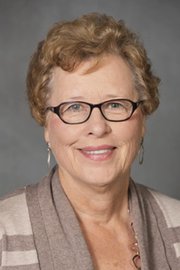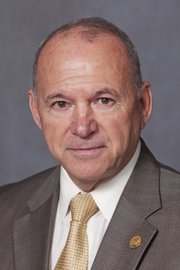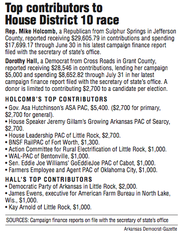In her rematch with Republican state Rep. Mike Holcomb, Democrat Dorothy Hall says she wants to improve the reading levels of young students and increase access to pre-kindergarten programs. She also said Holcomb isn’t doing much to help the House district in southeast Arkansas.
Holcomb touts his experience, his work to help constituents and his conservative voting record in the state House of Representatives.
Hall, a retired associate director of the University of Arkansas Cooperative Extension Service, and Holcomb, a retired Jefferson County judge, are vying for the House District 10 seat for the second time in the past four years. District 10 includes parts of Cleveland, Drew, Grant, Jefferson and Lincoln counties. The district includes Rison and Star City.
Holcomb, 65, lives in the Sulphur Springs community west of Pine Bluff in Jefferson County. Hall, 68, resides in the Cross Roads community south of Sheridan in Grant County.
In 2012, Holcomb beat Hall by 180 votes — 1,649 to 1,469 — in a Democratic primary runoff before defeating Rison Republican Charles Roberts to win the House seat. In 2014, he won re-election by defeating Drew County Republican Patricia Mays.
In the Nov. 8 general election, Holcomb is running as a Republican rather than a Democrat after he announced in August 2015 he was switching parties.
The salary for a House member is $39,400 a year. House members also receive per diem and mileage for attending legislative meetings. The term is for two years.
Hall said she is challenging Holcomb because “I still have the same interest in this area and I don’t see anything changing much.”
“I don’t see my opponent providing much leadership for change in the region,” she said in an interview last week in Sheridan. “You don’t see a lot of economic growth here, which really needs to happen in order to improve the lives of people … I think families are struggling.”
Hall said she wants to work on increasing the number of students reading at grade level in the fourth grade to help reduce the state’s need to build more prison beds. The number of students not reading at grade level in the fourth grade and the need for more prison beds are linked, she said.
“I would rather spend my money hiring a tutor for every three children and getting them reading to grade level than I would to build a … $200 million prison,” she said. “I want to work on what the problems are. I see too many Band-Aid approaches, treating symptoms … [Legislators] should be addressing the real issues that will help Arkansas families improve their quality of life.”
Hall said she also would push for increased state funding to expand access to pre-kindergarten programs because “pre-K is your best source of getting students school-ready. So that’s a boost to them begin able to read at grade level.” She said she wants to work on cutting the recidivism rate to reduce prison overcrowding.
Holcomb said he should be re-elected for a third term because he is accessible to his constituents, who know his conservative beliefs, and works on their behalf.
“I have done everything I can to help District 10 and … District 10 is in a dire situation with the exodus of people, but we are doing all we can with what we have,” he said in an interview at Watson Chapel. “I didn’t get elected just to get elected. I work hard. For a part-time job, there is nobody that works harder than me to try to connect with my people in my district and …. I help them in every way I can.”
Holcomb said he voted last year for Republican Gov. Asa Hutchinson’s approximately $100 million income-tax cut that helped people in his district, and legislation enacted to improve workforce education programs.
He said he wants to work on expanding vocational education programs, expanding Internet access in his legislative district, and increasing entry-level salaries for teachers in small school districts to be competitive with larger districts.
Holcomb said he doesn’t see how the budget would allow for increased pre-kindergarten funding.
“We increased educational funding to $2.2 billion [in fiscal 2017],” he said. “We are taking basically 50 cents out of the dollar now for education, so I think we are doing our share of funding education. It is what they do with it is what is important.”
The state’s $5.33 billion general-revenue budget in fiscal 2017 includes $2.188 billion for the public school fund, a $23.7 million increase from fiscal 2016, and $733 million for the state’s two- and four-year colleges.
Both Hall and Holcomb said they support Arkansas’ version of Medicaid expansion.
Hall said the program has helped a lot of families.
“It should be an issue that we can all find some common support for, and it should not be the divisive political issue that it has been in the past,” she said.
Holcomb said the program has helped rural hospitals in his legislative district, but “I have concerns about [insurance] premium increases” in the future.
First approved by the Legislature in 2013, the expansion of the Medicaid program extended coverage to adults with incomes of up to 138 percent of the poverty level: $16,394 for an individual, for instance, or $33,534 for a family of four.
Most of those covered under the expanded part of the program receive the coverage through what is known as the private option, which uses Medicaid funds to buy coverage through private insurance plans. More than 300,000 Arkansans have been enrolled for coverage through the Medicaid expansion.
When he announced he would be a Republican in August 2015, Holcomb said Democratic opposition to Hutchinson’s decision to end the state Department of Human Services’ agreements with Planned Parenthood was the breaking point.
Hutchinson cited videos that had been released by an anti-abortion group purporting to show that Planned Parenthood clinics in other states had profited from allowing patients to donate fetal tissue to medical research after abortions.
Medicaid funds cannot be used to pay for most abortions in the state, but the state has reimbursed Planned Parenthood for services such as birth-control counseling, cancer screening and pregnancy testing.
Holcomb said he supported Hutchinson’s decision to end the agreements with Planned Parenthood because “he thought he had enough information to do that.”
Hall said she disagreed with Hutchinson’s decision because “I think it was just purely for political [reasons]. I don’t think it was based on what is good for Arkansas.”
Holcomb said he opposes abortion except to save the life of the mother and in cases of rape or incest.
Hall said she is Catholic, but abortion is a symptom of a greater problem with teenage pregnancy in Arkansas, the lack of sex education in the public schools, and the difficulty for girls to get contraceptives when they need them. She declined to label her stance on abortion.


